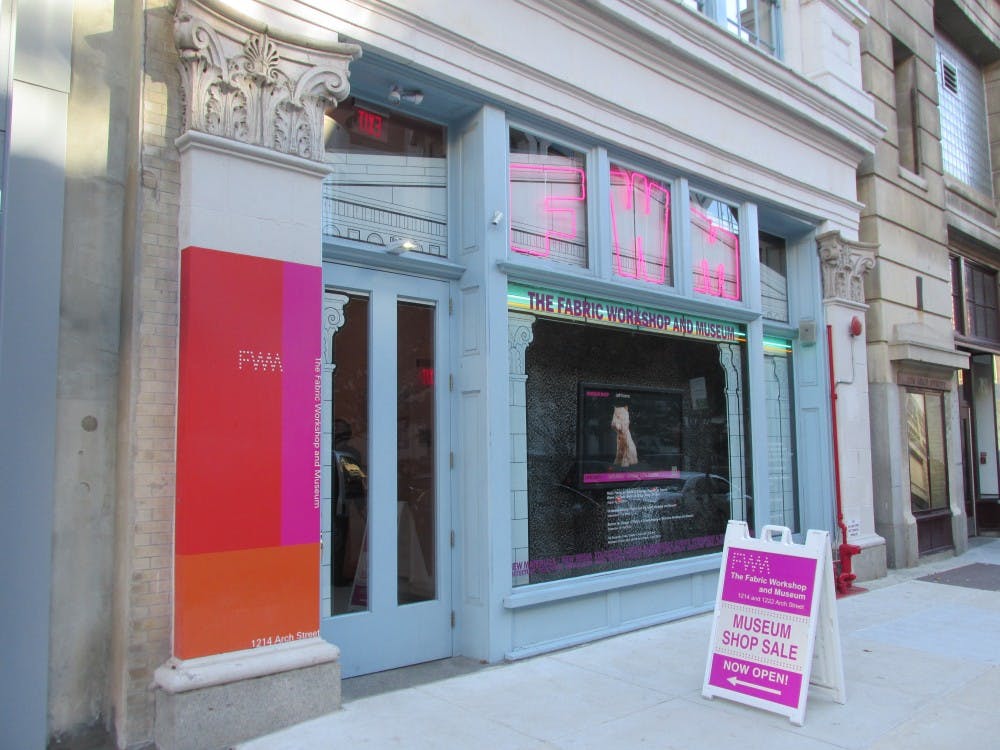Start on the 8th floor. The Fabric Workshop on 12th and Arch encourages a top-down approach for “Louis Kahn: The Power of Architecture," a traveling exhibition on view now through November 5th. But if you decide to start on the main level, and you make it to the far end (many will not—there’s enough fabulous artwork in the gift shop to spend a whole day), you’ll find the last object of the show: a quilt–like, topographical, floor–to–ceiling mural piece.
Designed by Louis Kahn and his fellow architect (and partner) Ann Tyng, the mural depicts the landscape of Pennsylvania. It is, of course, only a reproduction; the original remains at the Morton Weiss House (designed by Kahn) in East Norriton Township. (Ed. note: It so happens that the house is currently for sale, listed at just under one million dollars.)
Kahn and Tyng’s mural piece, along with Kahn’s Jewish Community Center mural replica are, perhaps, the only two of some 200+ objects included in “Louis Kahn: The Power of Architecture” that are something what you’d call typical of the Fabric Workshop. But then again, “typical” has no real meaning in the context of the uniquely distinguished museum.
Where floors one, two, and eight are currently showing Kahn, the remaining space is a permanent home to construction and print studios for the Workshop’s renowned Artist-in-Residence program (among other FWM programs) as well as an extensive permanent collection of 5,600+ objects. The Fabric Workshop and Museum collaborates with a diverse array of artists to urgently promote experimentation with new materials and new media. Artists have produced everything from video to sculpture, photography, and installation.
So, why Kahn? His buildings carry the physical (and aesthetic) weight of ancient structures while retaining an openness that’s reminiscent of Frank Lloyd Wright’s work. For this enigmatic style, Kahn is widely regarded as one of the most influential architects of the 20th century. He was a visionary, complete with the quirks and detriments that mark any true genius (this is elaborated on in his son’s documentary My Architect, A Son’s Journey). But what brings his work to this museum?
Philadelphia happens to be the exhibition’s homecoming. FWS will be the final stop of nine on the five–year tour of “The Power of Architecture,” organized by the Vitra Design Museum in Germany. Louis Kahn immigrated to the US as a young child from what would today be Estonia. He grew up with no money in Philly’s Northern Liberties, and it’s said that he would frequently use burnt sticks as drawing tools, selling his artwork in order to survive. He was educated at Penn and taught classes there until his death in 1974.
The city of Philadelphia served as the workshop that ultimately produced a short–lived but illustrious career for Kahn. His most famous and far–reaching projects include the Salk Institute (California), the Kimbell Art Museum (Texas), and the National Assembly of Bangladesh. He's also responsible for many local works, including nine distinctive homes in and around the Philly area. Penn’s own Goddard Laboratories was a Kahn project from the 60’s.
When Penn lacked the space to host the massive exhibition, The Fabric Workshop’s Executive Director Susan Lubowsky Talbott stepped up. Marion Boulton Stroud, the museum’s late founder, had for the last 8 years of her life wanted to showcase Kahn. She was, says Talbott, “a Kahn groupie." Stroud met Kahn while she was working for Margaret Esherick. At the time, Kahn happened to be designing Margaret’s house.
The exhibition is a success largely due to a major curatorial effort in highlighting Kahn’s artistic process. We aren’t limited to evidence of Kahn’s greatest accomplishments.To be frank, they would make for a thin show, as most of his work exists only on paper. What we see in mass are his sketches and models, some personal ephemera, and a few of the words by which he lived. We are offered a glimpse into his thoughts and the opportunity to discern his impossible vision of the utopian city.
The museum’s Communications Manager Laila Jadallah says she has seen lots of new faces in the museum since the Kahn exhibition opened on August 11th. The opening, which boasted lines well onto the street, was co-hosted by the neighboring Center for Architecture & Design. Several of Kahn’s friends and family members were present.
Overall, the exhibition has elicited a positive response from the Philadelphia community. One negative would be a sense of overcrowding, though excess is to be expected for any retrospective. With that in mind—if you’re interested in the details, two visits will be better than one.
The Fabric Workshop and Museum is open Monday through Friday from 10 a.m. to 6 p.m. and Saturdays and Sundays from 12 p.m. to 5 p.m. Admission is free; a $3 donation is suggested. For more info about special tours and lectures, check out FWS’s public programming.

